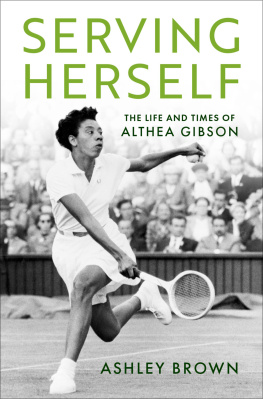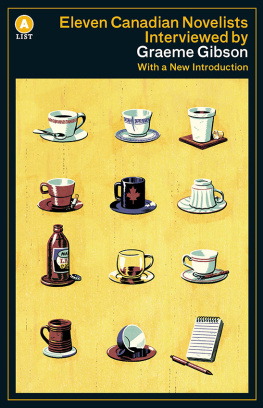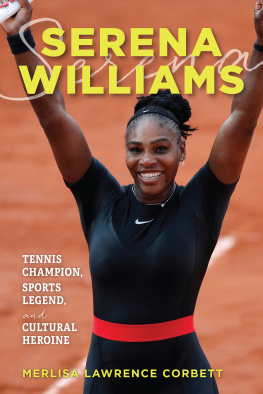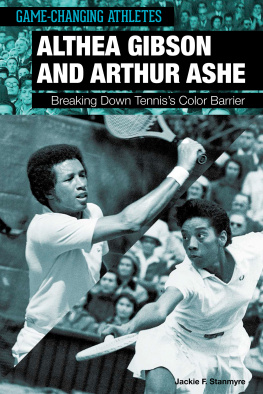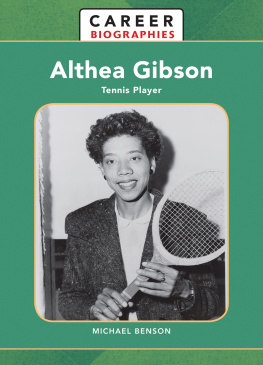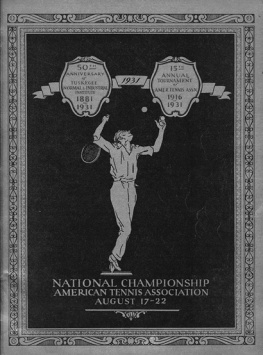Serving Herself
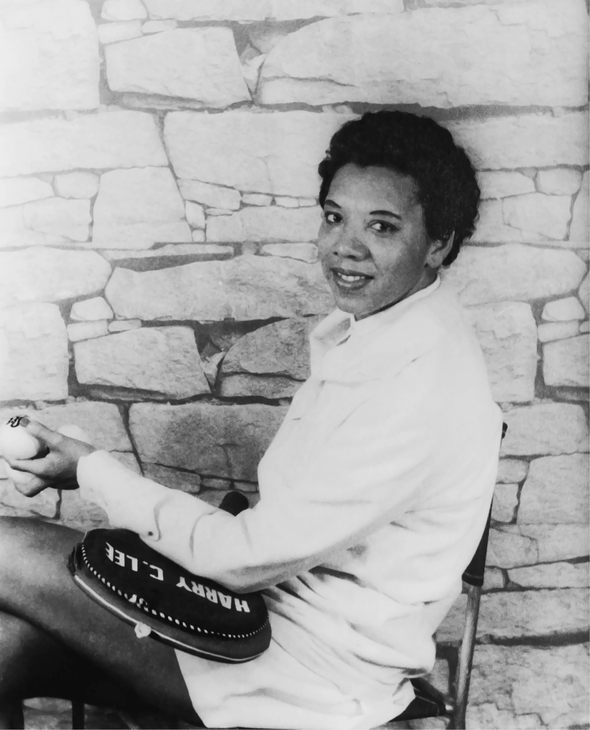
Althea Gibson, enigmatic and relaxed, in November 1958 as she began to embark on new pursuits after amateur tennis. I dont want to be put on a pedestal, she wrote. I just want to be reasonably successful and live a normal life with all the conveniences to make it so. I think Ive already got the main thing Ive always wanted, which is to be somebody, to have identity. Im Althea Gibson, the tennis champion. I hope it makes me happy.
Portrait by Carl Van Vechten. Everett/Shutterstock.

Oxford University Press is a department of the University of Oxford. It furthers the Universitys objective of excellence in research, scholarship, and education by publishing worldwide. Oxford is a registered trade mark of Oxford University Press in the UK and certain other countries.
Published in the United States of America by Oxford University Press
198 Madison Avenue, New York, NY 10016, United States of America.
Oxford University Press 2023
All rights reserved. No part of this publication may be reproduced, stored in a retrieval system, or transmitted, in any form or by any means, without the prior permission in writing of Oxford University Press, or as expressly permitted by law, by license, or under terms agreed with the appropriate reproduction rights organization. Inquiries concerning reproduction outside the scope of the above should be sent to the Rights Department, Oxford University Press, at the address above.
You must not circulate this work in any other form and you must impose this same condition on any acquirer.
Library of Congress Cataloging-in-Publication Data
Names: Brown, Ashley, author.
Title: Serving herself : the life and times of Althea Gibson / Ashley Brown.
Description: New York, NY : Oxford University Press, 2023. |
Includes bibliographical references and index.
Identifiers: LCCN 2022040682 (print) | LCCN 2022040683 (ebook) |
ISBN 9780197551752 (hardback) | ISBN 9780197551769 (updf ) |
ISBN 9780197551776 (epub) | ISBN 9780197551783
Subjects: LCSH: Gibson, Althea, 1927-2003. | African American tennis
playersBiography. | Women tennis playersUnited StatesBiography. |
TennisUnited StatesHistory20th century.
Classification: LCC GV 994.G53 B76 2023 (print) | LCC GV 994.G53 (ebook) |
DDC 796.342092 [B]dc23/eng/20220901
LC record available at https://lccn.loc.gov/2022040682
LC ebook record available at https://lccn.loc.gov/2022040683
DOI: 10.1093/oso/9780197551752.001.0001
For Ruby
Contents
the clich is true: it isnt how you start thats important, its how you finish. Serving Herself: The Life and Times of Althea Gibson began as my doctoral dissertation and represents more than a decade of research and writing. In that time, many people and institutions contributed to the completion of this book. I offer my heartfelt thanks to them here.
I could not have asked for a better editor for my first book than Susan Ferber. Susan saw the strengths and possibilities of this biography at the right time and consistently gave me the time, space, support, and trust that I needed. She is everythingscout, coach, analyst, cheerleader, teammate, talent manager, problem solver, and visionary. She is also a very fine person. Susan has been a dream to work with, and publishing with Oxford University Press has been a dream come true. Assembling the final product would not have happened without the careful diligence of copy editor Sue Warga, indexer Colleen Dunham, proofreader Bob Land, and production editor Amy Whitmer.
The University of WisconsinMadison has been my ideal professional home since 2017. The History Department is an all-star team. Whether an assistant, associate, or full professor, every member of the faculty has contributed to my growth here. My Madison story begins with the dedicated members of the search committee that brought me to campus in February 2017: Sue Lederer, Tony Michels, Karl Shoemaker, and co-chairs Susan Lee Johnson and David McDonald, both of whom became my mentors. Susan (now of the University of NevadaLas Vegas) opens doors and creatively paves paths. David is an astute reader and a terrific conversationalist, especially about the world and history of golf. In subsequent years, other colleagues stepped forward to further support my work. Brenda Gayle Plummer is a trailblazer whose encouragement has meant a great deal to me. Lee Palmer Wandel is a keen listener whose clear-sightedness has positively impacted my approach to pedagogy. Leonora Neville stands out as an advocate and a creative leader. As I entered the final stages of this project, Mary Louise Roberts became my mentor and friend. Lous attention to detail, wit, wisdom, and commitment to excellence have enhanced my work.
Allan H. (Bud) Selig plays an important role in my work. In 2010, Commissioner Selig, a UW-Madison alumnus, made a major gift to the History Department to create the Allan H. Selig Chair in the History of Sport and Society, the position that I have held since January 2020. The chair, a rarity at an American university, enables me to do what I love: encourage my students to think about the people, places, productions, institutions, and reach of American sports in new and expansive ways. My students teach me, and they apply their knowledge and skills to innovate their chosen fields. I draw much energy and inspiration from their examples. Teaching the course Biography in U.S. Sport History in the fall of 2021 was especially helpful as I completed the final chapters of the manuscript. The Selig Faculty Fellowship in Sport History, awarded during the 20172018 academic year, gave me the time and resources required to write, among other things, Uncomplimentary Things: Tennis Player Althea Gibson, Sexism, Homophobia, and Anti-Queerness in the Black Media, which the Journal of African American History published in 2021. The research support of the Selig Chair has been invaluable to bringing Serving Herself to fruition and thus familiarizing historians, students, and others with Althea Gibsons preeminent place in the history of sports. Commissioner Seligs generosity and leadership are signal reminders of the need for and vast impact of philanthropy in higher education.
Institutional support has been essential to Serving Herself. George Washington University backed my studies and research through its Presidential Merit Fellowship, the Jeffrey C. Kasch/GWU Horton-Vlach Fund for American Studies Research Fellowship, and multiple American Studies Academic Excellence Awards for Summer Research. The North American Society for Sport Historys 2015 Graduate Student Essay Prize, which led to the publication of my first article, Swinging for the State Department: American Women Tennis Players in Diplomatic Goodwill Tours, 19411959, in the Journal of Sport History, helped establish my reputation as a scholar. Giving the graduate student keynote address at the 2015 NASSH conference in Miami was an experience that I will savor for the rest of my career. The opportunity gave me a view of what the future might bring. The Alumnae Association of Mount Holyoke Colleges 1905 Fellowship funded an important research trip to Tallahassee, Florida, in 2017. An associateship at the Five College Womens Studies Research Center, led by Banu Subramanium, was a pivotal launchpad for my transition from graduate school to the professoriate. That same year, Lucas Wilson, Preston Smith, Lynda J. Morgan, and the Africana Studies Department at Mount Holyoke gave me a bridge that added to my appreciation for my alma mater. In 20172018, a postdoctoral fellowship at Emory Universitys James Weldon Johnson Institute for the Study of Race and Difference, led by Andra Gillespie, became an essential landmark on my professional journey. The University of WisconsinMadison has buttressed my endeavors through the Selig Chair, support from the Office of the Vice Chancellor for Research and Graduate Education, and, in 20202021, an invaluable Nellie McKay Research Fellowship. Accessing resources at UW-Madison would not have been possible without the diligent efforts and knowledge of Todd Anderson, Sophie Olson, and Jana Valeo. Leslie Abadie, Scott Burkhardt, Mike Burmeister, Lisa Normand, John Persike, and Jenny Schumacher make everything better. The support of the organizations and people named here supplied much-needed time to work, access to the many sources required to write this book, and additional authorial motivation.

